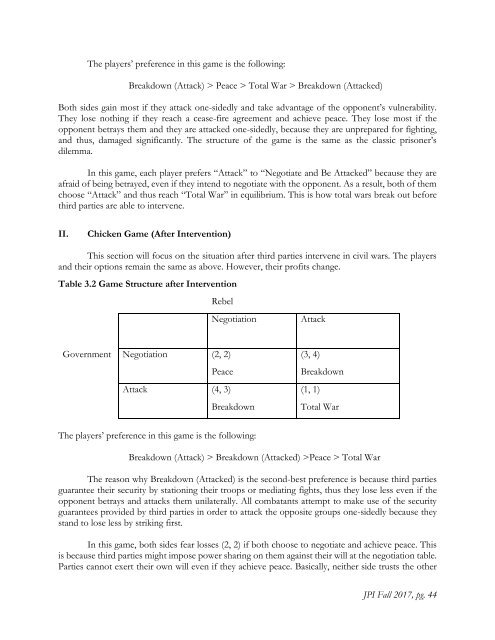JPI Spring 2018
Create successful ePaper yourself
Turn your PDF publications into a flip-book with our unique Google optimized e-Paper software.
The players’ preference in this game is the following:<br />
Breakdown (Attack) > Peace > Total War > Breakdown (Attacked)<br />
Both sides gain most if they attack one-sidedly and take advantage of the opponent’s vulnerability.<br />
They lose nothing if they reach a cease-fire agreement and achieve peace. They lose most if the<br />
opponent betrays them and they are attacked one-sidedly, because they are unprepared for fighting,<br />
and thus, damaged significantly. The structure of the game is the same as the classic prisoner’s<br />
dilemma.<br />
In this game, each player prefers “Attack” to “Negotiate and Be Attacked” because they are<br />
afraid of being betrayed, even if they intend to negotiate with the opponent. As a result, both of them<br />
choose “Attack” and thus reach “Total War” in equilibrium. This is how total wars break out before<br />
third parties are able to intervene.<br />
II.<br />
Chicken Game (After Intervention)<br />
This section will focus on the situation after third parties intervene in civil wars. The players<br />
and their options remain the same as above. However, their profits change.<br />
Table 3.2 Game Structure after Intervention<br />
Rebel<br />
Negotiation<br />
Attack<br />
Government Negotiation (2, 2)<br />
Peace<br />
Attack (4, 3)<br />
Breakdown<br />
(3, 4)<br />
Breakdown<br />
(1, 1)<br />
Total War<br />
The players’ preference in this game is the following:<br />
Breakdown (Attack) > Breakdown (Attacked) >Peace > Total War<br />
The reason why Breakdown (Attacked) is the second-best preference is because third parties<br />
guarantee their security by stationing their troops or mediating fights, thus they lose less even if the<br />
opponent betrays and attacks them unilaterally. All combatants attempt to make use of the security<br />
guarantees provided by third parties in order to attack the opposite groups one-sidedly because they<br />
stand to lose less by striking first.<br />
In this game, both sides fear losses (2, 2) if both choose to negotiate and achieve peace. This<br />
is because third parties might impose power sharing on them against their will at the negotiation table.<br />
Parties cannot exert their own will even if they achieve peace. Basically, neither side trusts the other<br />
<strong>JPI</strong> Fall 2017, pg. 44
















